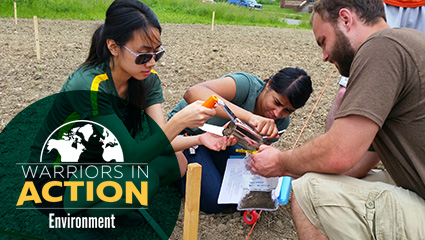
Urban farming on vacant tracts of city land continues to gain momentum. But what is in the soil beneath? Wayne State University faculty and student researchers are digging for the answers.
Last summer, a team of researchers led by WSU launched the first in a three-part initiative to determine the prevalence of contaminants in urban agriculture soil in Detroit, Pontiac and Rochester; establish linkages among the contaminants; and identify the agricultural risk factors for the contamination.
"Urban agriculture is growing and the food supply is increasing," said Yifan Zhang, associate professor of nutrition and food science in Wayne State's College of Liberal Arts and Sciences. "But people don't pay a lot of attention to this sector of agriculture. That's why we try to understand what the contamination level is. There isn't much data for food safety when it comes to urban farming. This is really the baseline data we're collecting."
The team was awarded more than $293,000 last year from the National Institute of Food and Agriculture of the United States Department of Agriculture for the three-year project, "An integrated approach to ensuring food safety and sustainability in urban agriculture in the greater Detroit area." Their goal is to provide urgently needed information on physical, chemical and biological contamination in urban agricultural environments.
The project aims to have a significant impact on research, education and outreach in food and agricultural sciences. Data on physical, chemical and biological contamination in soil and vegetables in urban agriculture; new curricula in food and agricultural sciences addressing urban agriculture and environmental impact on food safety and sustainability; and outreach materials for urban gardeners are major focus areas of the project.
After collecting soil and vegetable samples last summer from two sites in Detroit and one in Rochester, the researchers analyzed them for bacteria, chemicals and metals. The garden in Pontiac wasn't able to be tested last year, so the group is going back this summer to finish the work.
For bacteria, the researchers targeted two pathogens of E.coli and Enterococcus. Both are common in our food supply and were prevalent in the urban gardens tested as well. Chemical testing is still ongoing, Zhang said. For metals, the researchers primarily targeted lead, zinc, copper and arsenic.
"Lead is commonly found in urban soil," Zhang said. "And there is a potential for lead to transfer from the soil to vegetables. Also, for the workers on the farms and gardens there is a public health concern if they inhale the metals through dust."
After all of the data is collected and analyzed, the second phase will include educating the student researchers about what the soil and vegetable findings mean. The third phase will be a symposium-type event where those who work in urban gardening will be invited to a workshop where the data will be shared.
"In urban gardening, there is currently no regulatory requirement for people to do any soil testing before they develop anything on the site," Zhang said. "But you want to know what can be there. We will try to help our community to make informed decisions to understand what's going on before they open a garden."
Zhang leads the project along with co-project directors: Lawrence Lemke, Ph.D., associate professor of geology at WSU; Kequan Zhou, Ph.D., associate professor of nutrition and food science at WSU; and Fay Hansen, Ph.D., associate professor of biological sciences at Oakland University. Shawn McElmurry, associate professor of civil and environmental engineering in WSU's College of Engineering, is collaborating on the project.
Environmental impact
From water and urban farming to sustainability, green technologies and much more, Wayne State's location in the heart of Detroit provides students with endless opportunities to make a substantial difference in the city and beyond through interdisciplinary pathways in the arts and sciences, engineering, law, medicine, pharmacy, and business. Visit wayne.edu/action.
